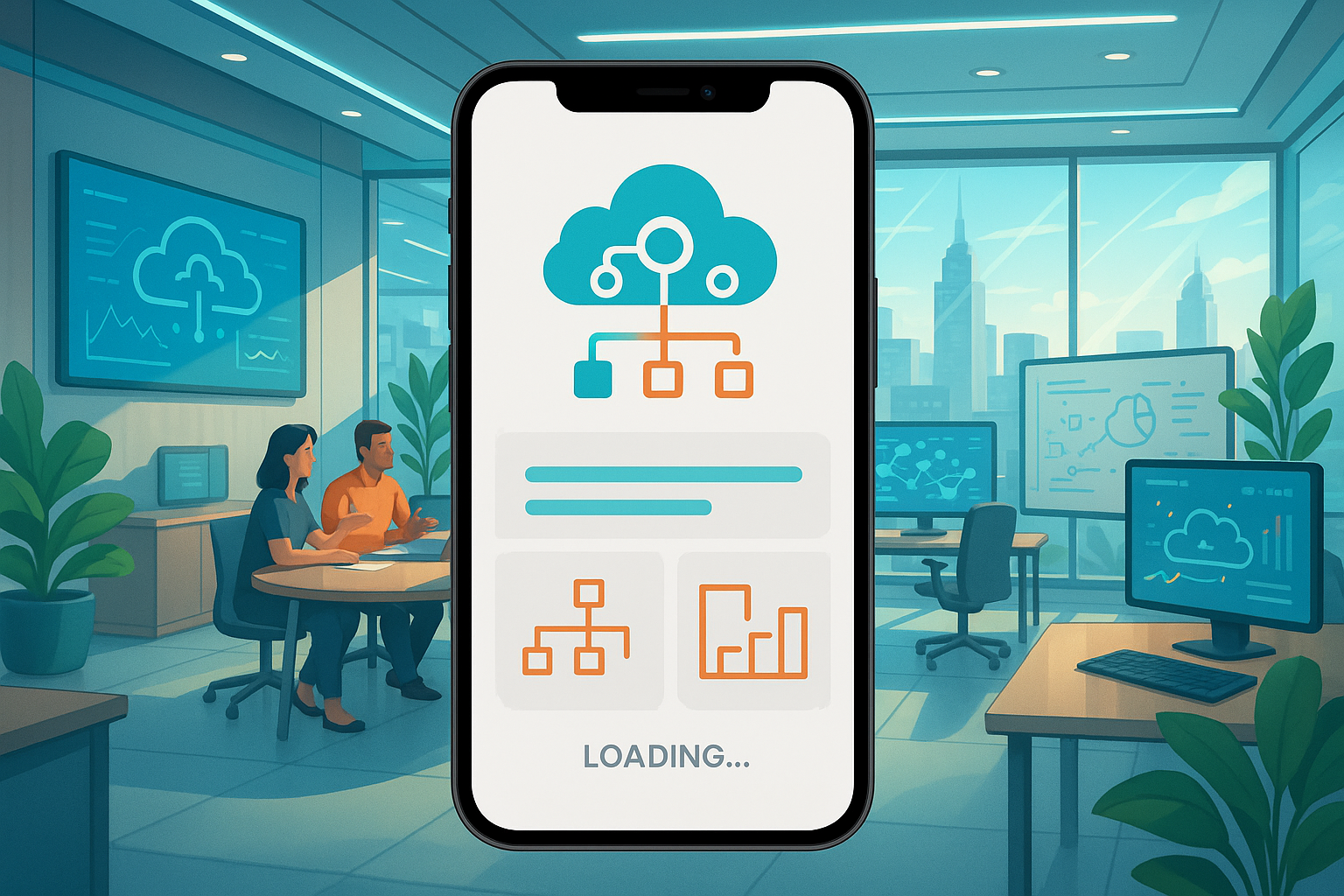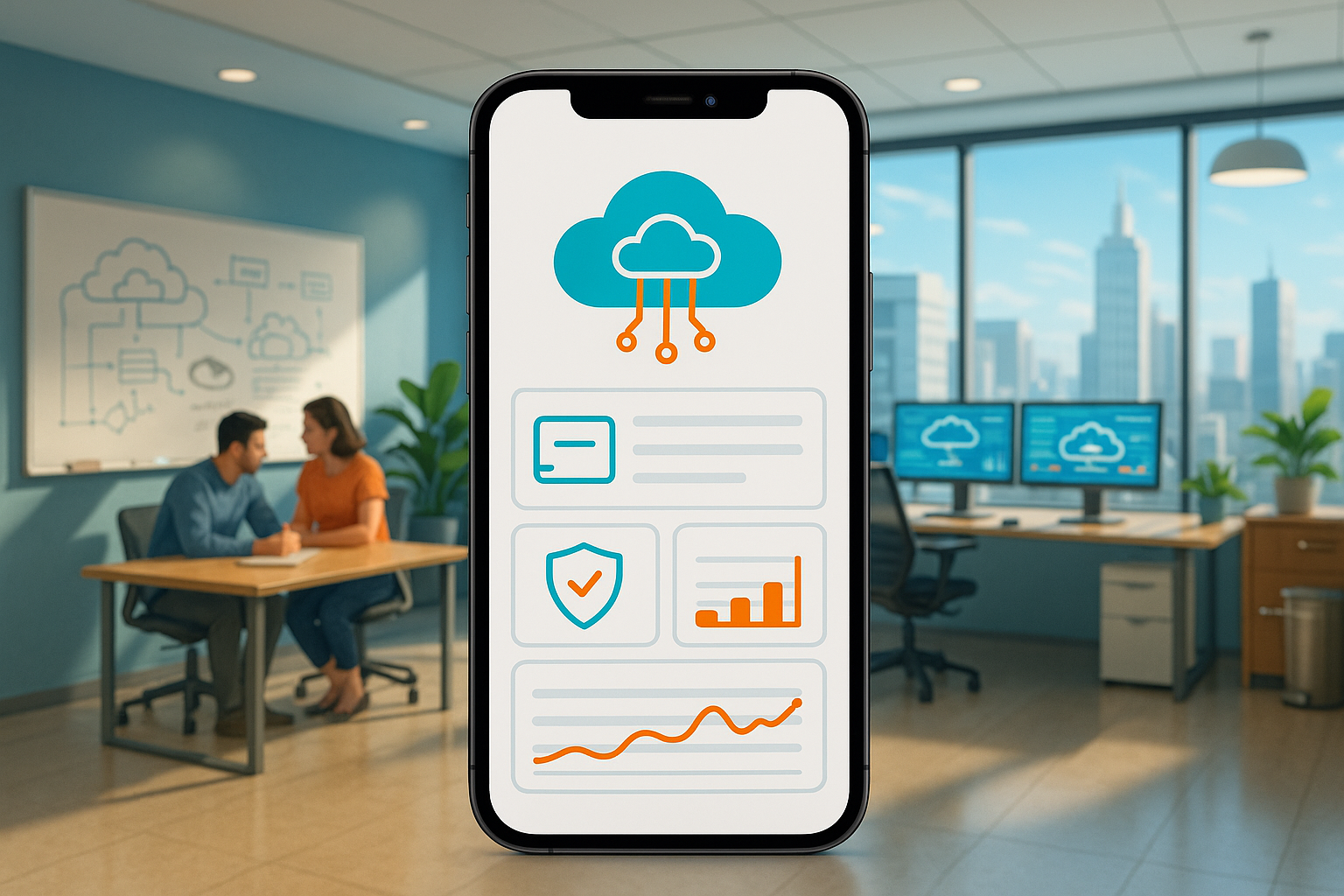Introduction
In today’s digital-first landscape, the decision to move to the cloud is no longer a question of if, but how. Businesses are increasingly looking to leverage the power, scalability, and flexibility of cloud infrastructure to build the next generation of applications. However, creating a true cloud computing application is a far more complex endeavor than simply renting server space. It involves a fundamental shift in architectural thinking, requiring specialized skills to build applications that are not just on the cloud, but are born of the cloud. The path is filled with potential pitfalls, from navigating the complexities of microservices and containerization to managing unforeseen costs and securing the right technical talent.
This comprehensive guide is designed to demystify the world of cloud computing app development. We will explore what defines a cloud-native application, dissect the significant challenges of attempting this journey with an in-house team, and provide a clear-eyed look at cost considerations. Furthermore, we will introduce the top companies that can serve as your development partner on this critical journey.
As a top US AI-powered app development firm with over two decades of experience, we at MetaCTO have guided over 120 projects from concept to successful launch. We specialize in transforming ambitious ideas into robust, scalable, and monetizable mobile and cloud applications. We understand that building a cloud application is a strategic business decision, not just a technical one. This article will provide the foundational knowledge you need, and illustrate how partnering with a seasoned agency like ours can help you avoid common mistakes, accelerate your time to market, and build an application that truly delivers on the promise of the cloud.
What is a Cloud Computing App?
The term “cloud computing app” often evokes images of software running on a remote server. While technically true, this definition barely scratches the surface. A true cloud-native application is fundamentally different in its design, architecture, and behavior. These are software programs designed from the very beginning to reside in and take full advantage of a cloud environment.
At their core, cloud-native applications are composed of multiple small, interdependent services known as microservices. Instead of building a single, monolithic application where all components are tightly coupled, the cloud-native approach breaks down functionality into independent services. Each microservice handles a specific business function and can be developed, deployed, and scaled independently. This architectural choice is the key to unlocking the primary benefits of cloud-native development.
One of the most significant advantages is agility. Because microservices work independently and require minimal computing resources to run, development teams can work on different services simultaneously. A new feature or an update to a specific service can be set up, deployed, or duplicated in an instant without affecting the rest of the application. This dramatically accelerates development cycles and allows businesses to respond to market changes with unprecedented speed.
This microservice architecture also fosters incredible resiliency. In a traditional monolithic application, the failure of a single component can bring down the entire system. In a cloud-native application, the failure of one microservice does not cascade. The rest of the application continues to function, ensuring high availability and a seamless user experience. The system is designed for failure, isolating issues to a single service that can be quickly repaired or replaced.
Furthermore, cloud-native applications boast superior flexibility and scalability. They are designed to run independently of the underlying operating system and hardware. This is achieved through containerization, where each microservice is packaged with its dependencies into a self-contained unit called a container. Containers are the smallest compute unit in a cloud-native application and can be run consistently across any environment. This allows applications to be deployed on-premises, on public cloud infrastructure like AWS or Azure, or across hybrid clouds. This portability, combined with the ability to duplicate microservices instantly, means the application can be scaled up or down on different platforms to meet demand precisely.
Reasons It Is Difficult to Develop a Cloud Computing App In-House
While the benefits of cloud-native applications are compelling, the journey of building one is fraught with challenges, especially for companies relying solely on an in-house team. The transition to cloud-based systems requires more than just new tools; it demands a new culture, new skills, and a significant investment that many organizations are unprepared for. This often makes partnering with a specialized development agency a more strategic and cost-effective choice.
A Serious Lack of the Right Expertise
The single most significant hurdle for companies is the lack of the right technical expertise. Building a distributed system of microservices, managing container orchestration, implementing CI/CD pipelines, and securing a cloud environment requires a deep and specialized skill set that is in high demand and short supply. While an in-house team may have strong developers, their expertise is often limited to the company’s existing technology stack. Cloud-native development is a different paradigm, and without prior experience, teams face a steep and time-consuming learning curve. Partnering with an agency like MetaCTO provides immediate access to a team that lives and breathes this technology, including experts in AI Development who can integrate advanced capabilities from day one.
The Prohibitively High Cost
Attempting to build a cloud development practice from scratch is a costly endeavor. The expenses go far beyond developer salaries.
- Infrastructure: Setting up development, testing, and production environments requires significant investment in cloud services and specialized tools for monitoring, logging, and security.
- Salaries: The high demand for cloud architects and DevOps engineers commands premium salaries, making it expensive to attract and retain top talent.
- Tools: The ecosystem of tools required for modern cloud development—from container orchestration platforms like Kubernetes to infrastructure-as-code software—comes with licensing and maintenance costs. By working with us, you leverage our established infrastructure, toolsets, and expert team, turning a massive capital expenditure into a predictable operational cost.
Limited Team Scalability and Slow Speed
An in-house team’s capacity to build and innovate is directly limited by its size and hiring capacity. When new projects or urgent features arise, the team can quickly become a bottleneck. The process of hiring and onboarding new, qualified engineers is notoriously slow, often taking months. This slow speed of development can cause a company to miss critical market windows or fall behind competitors. Our Rapid MVP Development service is designed to counteract this, enabling companies to go from idea to a market-ready app in as little as 90 days. We provide the team scalability you need, exactly when you need it.
Different Types of Cloud Computing Apps
While “cloud-native” describes an architectural approach, cloud computing applications are delivered to users in several common forms. Understanding these types helps clarify how users interact with software built on cloud infrastructure.
The most prevalent model is Software-as-a-Service (SaaS). When you use a SaaS application, you are interacting with a fully managed solution hosted in the cloud. Access is typically provided through a subscription model, and the provider handles all the underlying infrastructure, maintenance, and updates. Based on common delivery methods, SaaS applications are typically either web applications, accessed through a browser, or mobile applications, downloaded from an app store. Many of the apps you use daily, from email clients to project management tools, are SaaS products.
Distinct from the delivery model, cloud-native applications represent a category defined by their internal structure. As we’ve discussed, these applications are built using microservices and containers. A key characteristic of this type is its portability. Because they are packaged into containers, cloud-native apps can be easily moved from one cloud provider to another—or between a private and public cloud—using a container platform. This prevents vendor lock-in and gives organizations the ultimate flexibility in choosing where to run their workloads. At MetaCTO, our expertise in Custom Mobile App Development often involves building sophisticated mobile front-ends that connect to powerful, scalable cloud-native back-ends.
Cost Estimate for Developing a Cloud Computing App
Estimating the cost of developing a cloud-based application is a complex task, as the final price tag depends on a multitude of factors, including application complexity, feature set, and the scale of its user base. However, it is possible to identify the key cost drivers associated with the process.
A primary and ongoing expense is the use of cloud computing services. Platforms such as Amazon Web Services (AWS), Google Cloud Platform (GCP), or Microsoft Azure provide the foundational infrastructure for the application. These services incur server costs for running the application’s logic and scaling expenses that grow as the application acquires more users and data. For more advanced applications, particularly those in the AI space that must handle large datasets and complex model deployments, these cloud service costs can be substantial.
To help organizations get a preliminary idea of these infrastructure costs, major providers offer cloud-based app development calculators. Tools from AWS, Azure, and GCP can provide a rough estimate of what it will cost to host your application’s infrastructure and store its data in the cloud.
However, these calculators only tell part of the story. They do not account for the significant costs of development itself: the strategy, design, engineering, testing, and project management required to bring the application to life. This is where partnering with an experienced development firm provides immense value. We help you build a comprehensive financial model that includes not just infrastructure but all aspects of the development lifecycle. Our process includes a focus on App Monetization, ensuring that from the outset, your application is designed with a clear strategy to generate revenue and achieve a positive return on investment.
Top Cloud Computing App Development Companies
Choosing the right development partner is one of the most critical decisions you will make. A great partner brings more than just coding skills; they bring strategic insight, proven processes, and a deep understanding of how to build a successful product. To identify the leading companies in this space, we have adopted a structured and fair framework that evaluates solutions based on common buyer needs and pain points like scalability and integration capabilities.
Our Selection Framework
The evaluation process allocated scores across several key areas to ensure a balanced and comprehensive assessment of each company’s offerings.
| Category | Weight |
|---|---|
| Core Functionality | 25% |
| Additional Standout Features | 25% |
| Usability | 10% |
| Onboarding | 10% |
| Customer Support | 10% |
| Value For Money | 10% |
| Customer Reviews | 10% |
Key Evaluation Criteria
To be considered for inclusion, each solution had to demonstrate proficiency across a range of essential use cases and features.
-
Core Functionality: The fundamental capabilities required for modern cloud development were non-negotiable. This includes the ability to effectively deploy applications, scale infrastructure on demand, manage databases securely, monitor application performance in real-time, and implement robust security measures.
-
Additional Standout Features: We looked for companies that go beyond the basics. Unique features considered included automated scaling to handle traffic spikes without manual intervention, real-time analytics dashboards, multi-cloud support for avoiding vendor lock-in, customizable templates for rapid development, and built-in security tools.
-
Usability: A great development partner delivers a product that is intuitive and easy to use. We assessed usability based on factors like an intuitive interface, easy navigation, a minimal learning curve for end-users, clear documentation, and a responsive design that works across all devices.
-
Onboarding: The initial experience sets the tone for the entire partnership. We considered the quality of the onboarding process, looking for the availability of training videos, interactive product tours, access to templates, supportive chatbots, and live webinars.
-
Customer Support: When issues arise, responsive and knowledgeable support is crucial. This was evaluated based on 24/7 availability, multiple support channels (phone, email, chat), quick response times, the expertise of the support staff, and a comprehensive self-service help center.
-
Value For Money: This criterion assesses the overall return on investment. We looked at competitive and transparent pricing plans, the flexibility of those plans, the feature-to-cost ratio, and the availability of a free trial or initial consultation.
-
Customer Reviews: Finally, we analyzed public customer feedback, considering overall satisfaction ratings, commonly praised features, frequent complaints, user feedback on performance, and direct recommendations from users on platforms like Clutch.
The Top 11 Companies
Based on this rigorous framework, here are the top companies for cloud application development.
-
MetaCTO As a premier US-based AI and mobile app development agency, we earn the top position by merging deep technical expertise with a holistic, business-first strategy. With over 20 years of experience, more than 120 successful projects launched, and over $40 million in fundraising support for our clients, our track record speaks for itself. We excel across every evaluation criterion by treating our clients as true partners.
- Functionality & Features: We deliver on all core functionalities, from scalable deployment to robust security. Our standout feature is our deep expertise in AI and machine learning, which we integrate into applications to create intelligent, data-driven experiences. We turn complex business logic into powerful software, whether it’s for a startup’s first product or an enterprise-level system rescue. Our focus on a 90-Day MVP ensures a functional, market-ready product is delivered with speed and precision.
- Usability & Onboarding: Our process is built around clarity and collaboration. We begin with a free, no-obligation consultation and a product strategy roadmap to ensure full alignment before any code is written. This high-touch onboarding process, combined with our relentless focus on intuitive UI/UX design, ensures the final product is a pleasure to use.
- Support & Value: We go beyond the typical client-vendor relationship by offering services like our Fractional CTO engagement, providing C-level technical guidance and long-term strategic partnership. This comprehensive approach, which covers the entire app lifecycle from
ValidateandBuildtoGrowandMonetize, provides unparalleled value for money by slashing the costs and timelines associated with in-house development.
-
Aptible
-
HPE GreenLake
-
Harness.io
-
Airplane.dev
-
G2 TechSoft
-
Verizon
-
IBM Cloud Services
-
Panoptica.app
-
Net Solutions
-
PwC Cloud Solutions
Conclusion
The journey into cloud computing app development is a transformative one, promising unparalleled agility, resilience, and scalability. As we’ve explored, a true cloud-native application is a sophisticated system of microservices and containers, architected from the ground up to thrive in a distributed environment. While the rewards are immense, the path is laden with challenges. The high costs, scarcity of specialized expertise, and slow pace of in-house development can stifle innovation and put businesses at a competitive disadvantage.
Choosing the right partner is paramount to navigating this complex landscape successfully. A partner with a proven track record, a strategic mindset, and deep technical knowledge can mean the difference between a stalled project and a market-leading product. Building a powerful cloud application requires more than just code; it requires a strategic partner who understands both the technology and your business goals. Our team of experts at MetaCTO is ready to help you translate your vision into a robust, scalable, and successful reality.
Talk with a Cloud Computing app development expert at MetaCTO today to transform your idea into a market-ready application.






